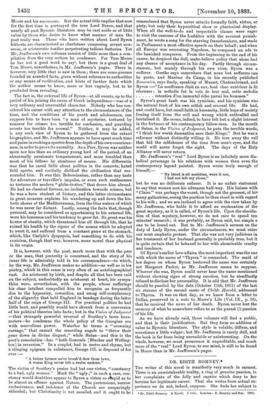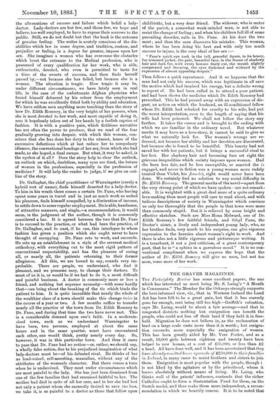DR. EDITH ROMNEY.* THE writer of this novel is manifestly
very much in earnest. There is an unmistakeable reality, a ring of genuine passion, in ber complaints of the folly and caprice which deny to her heroine her legitimate career. That she writes from actual ex- perience we do not, indeed, suppose. She finds her subject in
• Dr. Edith Romney. A Novel. 3 vols. Londoa : R. Bentley and Son. 1883.
the alternations of success and failure which befall a lady- doctor. Lady-doctors are but few, and those few, we hope and believe, too well employed, to have to expose their sorrows to the public. Still, we do not doubt but that the book is the outcome of genuine feeling. The writer is acutely conscious of the dis- abilities which law in some degree, and tradition, custom, and prejudice or feeling, in a degree far greater, impose upon her sex. She imagines a woman who has overcome the obstacles which beset the entrance to the Medical profession, who is possessed of every qualification for her work, who is able, enthusiastic, devoted, who even is permitted to taste for a time of the sweets of success,. and then finds herself passed by,—not because she has failed, but because she is a woman. The situation is tragic. How tragic it may be, under different circumstances, we have lately seen in real life, in the case of the unfortunate Afghan physician who found himself debarred by his colour from the employment for which he was excellently fitted both by ability and education. We have seldom seen anything more touching than the story of how Dr. Edith Romney, in the very height of her powers, when she is most devoted to her work, and most capable of doing it, sees it hopelessly taken out of her hands by a foolish caprice of fashion. It is with a positive pain, which fictitious narrative has not often the power to produce, that we read of the fear gradually growing into despair, with which this woman, con- scious that she has done her duty to the utmost, hears of the successive defections which at last reduce her to compulsory idleness, the conventional bondage of her sex, from which she had made, as she hoped, a final escape. But what, it may be asked, is the upshot of it all ? Does the story help to clear the outlook, an outlook on which, doubtless, many eyes are fixed, the future of woman in the professions, especially in the profession of medicine P It will help the reader to judge, if we give an out- line of the story.
Dr. Gallagher, the chief practitioner of Wanningster (surely a hybrid sort of name), finds himself deserted for a lady-doctor. To him in his wrath there comes a certain Dr. Pane, who having spent some years in travel and in just as much work as suited his pleasure, finds himself compelled, by a diminution of income, to settle down to some regular employment. He is able, handsome, of attractive manners, and single,—a recommendation, it would seem, in the judgment of the author, though it is commonly considered a bar. It is agreed between the two that Dr. Fane is to succeed to the practice,.or what had been the practice, of Dr. Gallagher, and to oust, if. he can, this interloper to whom fashion has given a position which she ought never to have thought of occupying. Dr. Fane sets to work, and succeeds. He sets up an establishment in a style of the severest medical orthodoxy, with everything cut to the most rigid pattern of conventional respectability, and has the pleasure of seeing all, or nearly all, the patients returning to their former allegiance. All this, we are bound to say, sounds very im- probable. There are people, we understand, who find it pleasant, and we presume easy, to change their doctors. To most of us it is, or would be if we had to do it, a most difficult and painful business. A doctor is commonly more or less a friend, and nothing but supreme necessity—with some hardly that—can bring about the breaking of the tie which binds the patient to him. It is quite incredible that nearly the whole of the wealthier class of a town should make this change twice in the course of a year or two. A few months suffice to transfer nearly all the practice of the town from Dr. Edith Romney to Dr. Fane, and during that time the two have never met. This is a considerable demand upon one's faith. In a moderate- sized town, such as we understand Wanningster to have been, two persons, employed at about the same hours and in the same quarter, must have encountered each other, one would think, pretty nearly every day. So, however, it was in this particular town. And thus it came to pass that Dr. Fane had no notion—or, rather, we should say, a wholly false notion, due to his prejudiced imagination of what lady-doctors must be—of his defeated rival. He thinks of her as loud-voiced, self-asserting, masculine, without any of the attributes of the womanly character. But there comes a time when he is undeceived. They meet under circumstances which are most painful to the lady. She has just been dismissed from one of the few families that had remained faithful to her. The mother had died in spite of all her care, and in her she had lost not only a patient whom she earnestly desired to save (no loss, we take it, is so painful to a doctor as those that follow upon childbirth), but a very dear friend. The widower, who is rector of the parish, a somewhat weak-minded man, is not able to resist the change of feeling ; and when his children fall ill of some prevailing disorder, calls in Dr. Fane. At his door the two meet ; and then the man discovers his mistake. This woman, whom he has been doing his best and with only too much success to injure, is the very ideal of her sex :-
" Farm's quick eye took in the tall, graceful figure, in its heavy, fur-trimmed jacket, the pale, beautiful face, in the frame of shadowy hair and dark fur, with every feature finely cut, the mouth slightly compressed and drooping, the eyes darkened and widened by the expression of almost appealing despair."
Then follows a quick repentance. And it so happens that the man had not only his success, which was legitimate in all save the motive which had inspired his energy, but a definite wrong to repent of. He had been called in to attend a poor patient, and had been shown the medicine which Dr. Edith Romney had prescribed. This be had poured away with an expression of dis- gust, an action on which the husband, an ill-conditioned fellow whom Dr. Edith had rebuked for cruelty to his wife, had put the worst interpretation, even to the length of saying that his wife had been poisoned. We shall not follow the story any further. It takes the course and is brought to the ending with which we are familiar in the ordinary novel. But whatever
merits it may have as a love-story, it cannot be said to give us what we naturally look for. The woman's wrongs are re- dressed, not because her ability and her devotion are discovered, but because she is found to be beautiful. This beauty had not saved her with her patients, but it brings a successful rival to
her feet. Her shadowy hair and becoming furs set right the grievous inequalities which society imposes upon woman. Had she been less fair, and he less susceptible, or married (he is engaged, and never in fiction was a young woman more rudely treated than Violet, his fianege), right would never have been done. We certainly find no solution to any social difficulty in Dr. Edith Romney. The general merits of the novel—apart from the very strong point of which we have spoken—are not remark- able. It is weighted with a great deal more of a quite ordinary love-making than most people will care to read about, and with tedious descriptions of society in Wanningster which convince us only too thoroughly that the people in that town were more than commonly stupid. But it is relieved by some bright and effective sketches. Such are Miss Mona Melward, one of Dr. Edith Romney's few faithful friends, and Sibyl Pane, the Doctor's sister, a lively and independent young lady, who, as her brother finds, very much to his surprise, can give vigorous expression to the heresies about woman's right to work. And there is also not a little vigorous and picturesque writing. It is a trenchant, if not a just criticism, of a great contemporary poet, that he is " a sphinx in a garrulous mood." It is no con- ventional compliment when we express the hope that the author of .Dr. Edith Romney will give us soon, but not too soon, some more of her work.



































 Previous page
Previous page